What are the most important skills to help us through this period?
As time goes by, it’s clear that none of us really understand how things are going to play out – not really – whether we’re considering the long-term or even the short-term.

With this in mind, I wanted to know what skills our inspiring leaders consider to be the most important to help us to navigate and survive through this challenging period.
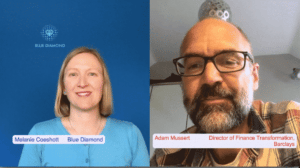
Adam Mussert – That sense of openness and awareness of how people have been affected by everything and how they want to come back to work really.
Maybe a bit of creativity because people have needed to embrace this throughout this period: how they work, what times they work, how they fit in other commitments they’ve got within their families. So maybe some of those creative juices will be useful to take with them as they go back into the workplace, as well as flexibility.
I’ve been focusing on the soft skills, but many organisations will have been significantly impacted by this, meaning some different harder skills may be necessary in terms of re-prioritising the work they need to do, that the services they need to deliver, establishing relationships with clients and stakeholders etc. There may also need to be some tough economic decisions.
I think there will need to be a fair dose of resilience as well as people face up to that reality.
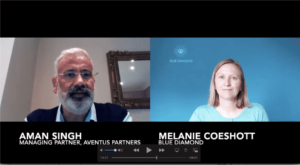
Aman Singh – It has to be communication, both internally and externally.
Externally, having those channels open and being willing to listen to your clients. A lot of times you can’t really help as such, but being there with a listening ear is more important than anything else. Everything from the government, the facilities that the government is providing businesses with, being there to support them with their cash flow challenges. Communication is very, very important, and in some cases, it will almost be on a weekly basis, so much more frequently than before.
Internally, I’ve tried to communicate twice a week with every member of the team. With some team members, it’s been a lot more. We’ve been extremely busy. Our busiest period is between January and June, so we were in the middle of our busy season when the lockdown happened. It was important that we had communication channels open, and that helped us to be resilient and deliver on time. As things come back to normality, communication and empathy have to remain. That would be very, very important.
I think we also need to be courageous and brave. In the next 12 months, no one knows how this will turn out, so there will have to be courage. Courage would be another important aspect of all our characteristics.
Debb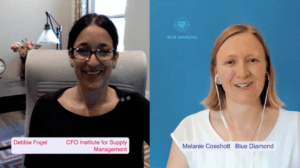
Debbie Fogel – Well, I definitely think the first one is resilience. I think we have a lot of challenges right now and additional stresses, whether it’s concerned with health and well-being for ourselves or our loved ones or the ability to work remotely. All of the changes that we’re facing create stress and I think being able to just survive through it and be resilient is probably one of the most important things. I think doing that is just taking it really truly one day at a time, one step at a time, and we don’t know what’s going to happen in a week, or a month or several months from now potentially, but we maybe don’t need to know. I just deal with what we have to do right here right now and that helps us to be resilient.
I definitely think showing empathy in a stronger way is really important during this particular time, because of all of this stress and helping each other be resilient. We’re showing more empathy than probably we ever have needed to in an organisational setting before, including patience with ourselves and with others.
Again, I think the learning mindset is critical because things have changed and we may not be able to see it yet in the rear-view mirror with some hindsight, but really accept that we have to do things differently and the solutions are going to be different and really learning agile. Whether we need to learn a new technology, a new way of operating, or a new way of communicating. Whatever it is just being open to change and willing to learn, I think will help us very much through this time period.
And maybe strategic thinking also. I think it’s really important to have the ability to think big and out of the box, probably more so right now than ever.
And for sure, a sense of humour. Humour helps us learn, and makes it more enjoyable for the people we’re around, and takes some of that stress away. So definitely a sense of humour can be very helpful.
Celine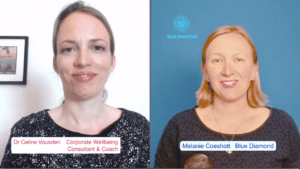
Dr Celine Vousden – As I mentioned earlier, that ability to navigate change and increase your tolerance to uncertainty, because from a brain perspective, we are wired to perceive change as a potential threat. It causes us to experience symptoms, such as stress, and that impacts how we think and reduces our creativity and how we make decisions.
The more we’re able to find a way to tolerate uncertainty the better we’ll cope. Because I think there is huge uncertainty about what’s going to happen over the next couple of years, whether a vaccine will be found or not, and what’s going to be the economic impact and fallout. There are so many factors to consider.
All that we can do is be aware of that moment, and what can we do to manage the moment, and have a vision in mind but be very aware that the situation may change. All we can do to cultivate an ability to remain agile, change accordingly, adjust, and not be fixed to a particular outcome is going to be a vital skill, I think, in terms of flexibility.
Another is emotional regulation and emotional self-awareness because we will be experiencing a range of emotions through this period. As things change, we are going to have to adjust. We had a lot of that in the first month or so, that shock that many of us were experiencing – corona insomnia as it was called. That’s still going on for many, the anxiety, and uncertainty. How can we learn to recognize the emotions that we’re feeling and how can we manage them and really become much more adept at dealing with our own emotional ups and downs and emotional experiences,
This, for me, will be vital to master.
This current situation gives us an opportunity to learn how to do that, which can fuel the elements of great leadership. This is the opportunity to do that. Can we embrace that? To find effective ways of learning more about ourselves and how we manage our emotions? That’s not to stop or suppress them but to accept and find ways to shift us back into a more helpful state that works for us. Learning how to manage stress is a key feature of what many of us are feeling, with that lack of control at the minute and the uncertainty that we’re experiencing. Cultivating resilience to see us through the next year, two years, as things go through.
Other elements will be communication as I mentioned before and how we communicate effectively with our teams. What springs to mind is the Airbnb CEO who sent out that really heartfelt letter to his staff and to the people explaining how he, unfortunately, has to let some people go. It was so humbly written, and so you were able to recognize the values these people have brought. He was clearly very saddened by it, he was very open about that. That open, honest communication and vulnerability, I suppose, is one way of describing it.
And finally, empathy to really understand that we’re all going through different experiences, depending on our individual situations. There are many factors influencing what we’re currently experiencing. We may know somebody in our family who’s been affected by the virus, or we may be experiencing financial difficulties, the strain at home, or relationships under strain. I saw something like a 42% increase in inquiries about divorce. There’s so much going on. It’s important to really have empathy for our colleagues and the people around us. To understand that there’s a lot going on that may be influencing how they are.
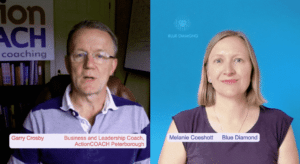
Garry Crosby – Well, it’s a skill that’s relevant now, but I would say is also relevant at any point in your life, whether that’s in your personal life or your business life and I call it, not ‘time management’ but ‘managing yourself through time’ and this is all about really beginning to understand how you use your time.
So, going back you mentioned Stephen Covey at the beginning, I always urge my clients to try and determine the difference between what’s really urgent and what’s really important in their business, because many people respond to other people’s ideas of urgency like them calling and them demanding time and stealing time off you. So, there’s that to think about.
And I also say to people, one of the really good things you can do, is try to put some Immovable Objects in your diary and I know we’ve talked about this before in planning events. That is the idea that rather like your child’s gym class on a Friday evening, which happens regardless of any other thing in the diary. What could you put in your working week, that would always be there and always be honoured? Because every time you put something in there and then don’t honour it, then you lose that bit of time, so Immovable Objects, means you’re just going to focus on something, it’s going to be there for an hour, and you’re just going to get something done. How disciplined do you have to be to get something like this done? So that’s a really important quality for me.
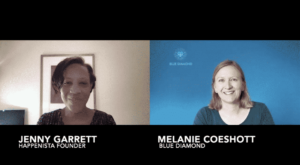
Jenny Garrett – Good question.
I think that resilience is key right now. The ability to bounce forward, not just bounce back, but bounce forward from the life we’re living. They talk about a VUCA world, volatile, uncertain, complex, and ambiguous. I don’t think that’s going away and as a result, we really need to be resilient to know that there are going to be setbacks on the road, there’s going to be difficulties and so we really need to think about what enables us to bounce forward.
Things like emotional intelligence, things like knowing our values and being purposeful. Things like looking after our physical well-being. Things like knowing what our strengths are and our resources are, and having good relationships as well that we can turn to and get support. I think resilience is really important.
The second thing I would say is adaptability and creativity. The ability you make your plan but know that actually, you might need plan B, C, D, E, or F because things might change so rapidly that that plan might not go exactly as you want it to, but you’re adaptable to move and change accordingly and that you can come up with some creative approaches to deal with those changes. I think those three things: resilience, adaptability and creativity are the skills we need to get us through.

Johan Gabriels – I think being agile is very important. Not only as an individual but also for companies.
When all this started in early March, we had to react very quickly. Our company had to react very quickly, de-risk the balance sheet, look at cash, and look at the capital. The whole organisation had to look at those objectives. Which was very different from the months before, for most people.
Now that we’re gradually coming back – maybe not back to the old normal, but the new normal – flexibility and agility will be required.
I think we’ll also go back to more entrepreneurial skills.
Nobody knows what’s really going to happen. I’m sure that in a couple of years, there will be some very interesting books being written, on how it should have been done, but for the moment nobody really knows. So, we’ll test things out and see what works best.
The other thing I mentioned before is empathy. You need a certain empathy with your clients. We are in this together. How we can help them. This is more kind of coming together, let’s get out of this crisis together. Because, even if we’re doing quite well, ultimately, we can only do as well as the clients we have. We obviously need to work together on this.
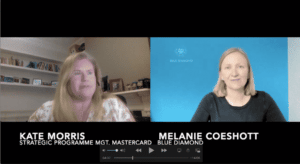
Kate Morris – Firstly, active listening. You can have so many things going on and beeping at you at the time when you’re trying to listen to people. If that’s your only mode of communication, you really need to focus by turning off the other distractions. Think about how you make yourself present at the moment when you’re talking and keep that going.
Secondly, checking in on how you’re feeling. It’s really good to check it in. I usually have to do it a couple of times a day, depending on the types of meetings that I’m having. “Okay, I’ve got to be in the right headspace to do it.”
Then patience, things are not going to be the same as they were, and they will not be as easy, most likely. You’re going to have to take the time to make sure people’s connections happen, that you can share a screen that they got the attachment, you have to work on that.
Again, with that idea of a slow and fast pace, people are going to deal with this in different ways. You have to think about how you build that in and give yourself time to be able to step away, go and get a coffee, go and move around, do stuff, it’s really important. Time management, for me, is a big deal. Because it’s late at night, I want to go to bed. I also want to get through all of the important things that I need to, do across the world before I go to bed.
I’m usually the bossy boots that keep time when it comes to meetings because I want to get through it all. I’m usually back to back, I’m sure everyone is feeling that at the moment. You need to be conscious of the time you’re giving to people and stick to it.
The last one, for me, is about staying curious and finding your connection with what you’re doing. Working at MasterCard is awesome. There are so many things that we can be involved in and be passionate about, but it’s not just about the day-to-day running of Prepaid Services. I’m part of the Pride team. I’m working with the tech hubs on our 12 monthly strategies. This is awesome. I get the ability to talk and collaborate with so many people about things that I’m curious about. It spawns my understanding of where I fit into the bigger picture but also covers the human aspect.
The work that I do with the team in Egypt is all around financial security and having the ability to help people who wouldn’t get a normal bank account, to have a mobile wallet, a digital wallet. That gives them that financial freedom, they can get paid for a job. They can feed their family. That’s inspiring and a passionate reason for me to stay online, to do stuff. I can really add value. Finding your connection into what you do, really works for me and I’m sure this has wider attraction too.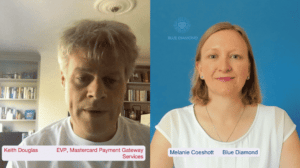
Keith Douglas – I think collaboration is a hugely important skill, whether in a physical or non-physical environment. I think our ability to collaborate has been tested in this kind of working-from-home environment. Principally, in my organisation, we’re using voice rather than necessarily video like we are today. Where I have had the opportunity to use video, I certainly can see and understand the benefits of it to drive, motivate and inspire others to do things. So, for me, being present physically is important, but using channels like video does help.
The collaboration piece is important in so far as even when you know you don’t necessarily see the individual or the group that you’re talking to you know, we all know about body language, and we all know about voice. So, the skills to unpick this, “Does that person really mean what they’re saying?”. You’ve only got that basis of collaboration and or that discussion, so it’s certainly a talent. I certainly try to fine-tune my questions so that I can better understand how the individual’s feeling, and thinking and not just rely on what they are saying. So that’s one aspect.
The other aspect for me is using technology tools like Microsoft Teams, which is what we happen to use at MasterCard, are really excellent. Shame on me for not really embracing that kind of technology that has existed for a long time. I’m finding it really helpful. I can quickly log in to the app or go onto the website and get the information I need, without bothering an individual with an email or calling them. So, I think getting comfortable with tools like that is hugely important in terms of how we work going forward and certainly, these last ten weeks have given me not only exposure but a degree of comfort. Another great reassurance is that you can manage your business and your people in a variety of different ways.
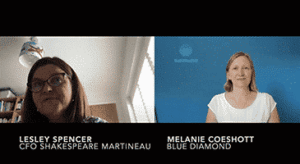
Lesley Spencer – I don’t think it’s about technical skills, I think it’s very much about communication, about the ability to trust people, the ability to think longer-term, to have an open mind, to be transparent.
So, I think it is also about how you deal with people, so you can build a really high-functioning team, all pulling in the same direction. I think those are the things that you would look for in the team that you work with.

Thanks for reading. Check out the other interviews in the Post Lockdown Leadership Review series.
Check out other Blue Diamond articles to help you take control of your work and life.

